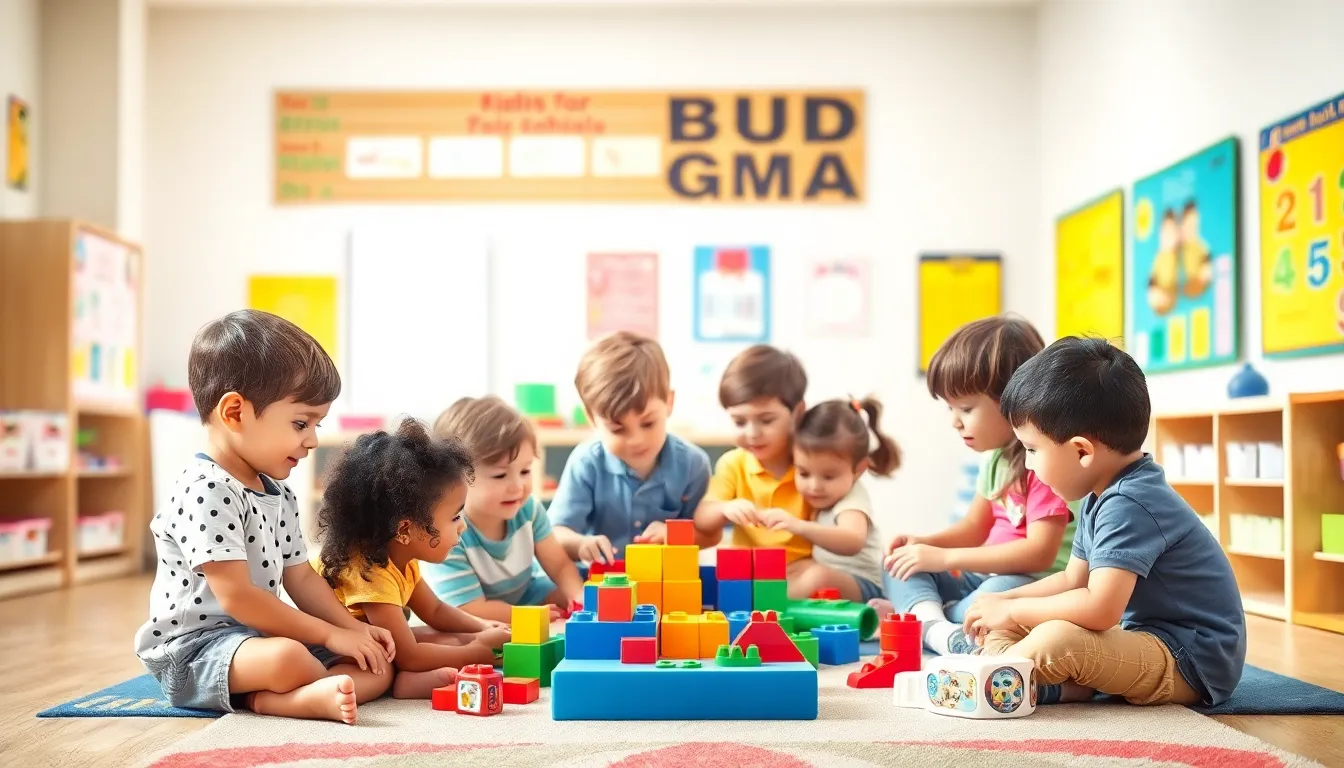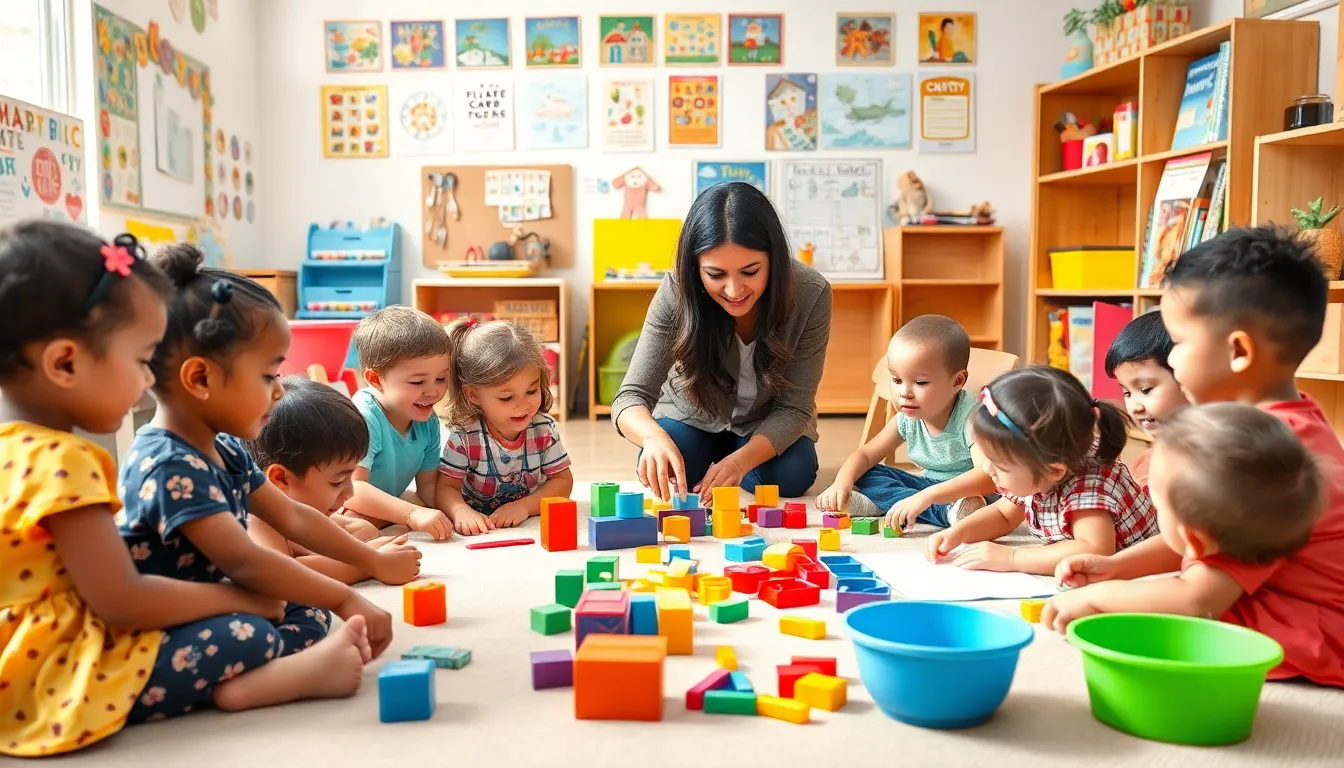In today’s fast-paced world, the importance of early childhood education can’t be overstated. It’s not just about teaching kids their ABCs and 123s; it’s about laying the foundation for lifelong learning. Imagine a classroom filled with tiny humans, each one bursting with curiosity and energy. Now picture yourself guiding them through this exciting journey. Sounds rewarding, right?
Table of Contents
ToggleOverview of Early Childhood Education Course
Early childhood education courses provide essential training for those working with young children. These programs cover developmentally appropriate practices that support cognitive, social, and emotional growth. Curriculum components often include child development theories, learning environments, and assessment strategies, ensuring educators understand how to foster a positive learning atmosphere.
Participants explore various teaching methodologies, engaging them in hands-on activities that enhance observations and interactions with children. A critical aspect involves understanding the role of play in learning, highlighting how children learn best through exploration and discovery.
Additionally, courses often address family engagement, emphasizing the importance of partnerships between educators and families. Communication strategies serve to strengthen these relationships, ultimately benefiting children’s development.
Graduates of early childhood education courses often pursue careers as teachers, program directors, or child care administrators. Many continue their education with advanced degrees or certifications focusing on specialized areas such as special education or curriculum development.
Job opportunities in early childhood education expand as demand grows, with the U.S. Bureau of Labor Statistics projecting a 2% increase in employment through 2029. By preparing educators to meet diverse children’s needs, early childhood education courses play a vital role in shaping future generations.
Importance of Early Childhood Education

Early childhood education significantly influences a child’s development and future success. This educational phase establishes vital skills that extend beyond academics.
Developmental Benefits
Cognitive growth is a primary focus during early childhood education. Children engage with age-appropriate materials that encourage exploration and critical thinking. Research indicates that quality early education programs promote brain development, with children showing improved literacy and numeracy skills. Engaging in structured play supports learning, allowing children to experiment and solve problems. This hands-on approach nurtures a love for learning that lasts a lifetime.
Social and Emotional Growth
Social skills flourish in early childhood education settings. Interactions with peers facilitate communication and teamwork, essential for building relationships. Children learn to express feelings and manage conflicts, contributing to emotional intelligence. Educators provide guidance that fosters resilience, empathy, and self-regulation. Studies show that children exposed to nurturing environments demonstrate improved social competencies. This early foundation not only benefits personal development but also enhances future academic success.
Course Curriculum and Structure
Early childhood education courses encompass a comprehensive curriculum designed to equip educators with essential skills. Curricula often blend theoretical knowledge with practical application, ensuring a well-rounded approach to teaching young children.
Core Subjects
Core subjects typically include child development, learning theories, and assessment methods. Courses on child development emphasize physiological and psychological growth milestones. Learning theories outline various approaches, such as constructivism and behaviorism, helping educators understand how children acquire knowledge. Assessment methods focus on observing and interpreting children’s behaviors and interactions, allowing educators to tailor instruction to individual needs. Such focused studies prepare educators for diverse learning environments.
Teaching Methodologies
Teaching methodologies consist of strategies that foster engagement and interactive learning. Approaches often include play-based learning, inquiry-based learning, and cooperative learning. Play-based learning allows children to explore their interests, promoting creativity and critical thinking. Inquiry-based learning encourages children to ask questions and seek answers, enhancing their problem-solving skills. Cooperative learning fosters collaboration among peers, strengthening social skills while building a sense of community. These methodologies offer educators various tools to nurture holistic child development.
Career Opportunities in Early Childhood Education
A diverse range of career paths exist in early childhood education, reflecting the need for skilled professionals to support young learners. Graduates often find rewarding positions that influence children’s lives and futures.
Job Roles and Responsibilities
Teaching positions focus on facilitating learning experiences for children ages three to eight. Responsibilities include developing lesson plans, assessing student progress, and creating engaging learning environments. Administrators oversee programs, ensuring compliance with regulations and managing staff. Additionally, specialists provide targeted support in areas such as speech, language, or special education. Collaboration with families enhances children’s development, making communication an essential part of every role.
Potential Employers
Various employers seek early childhood education professionals. Public and private schools frequently hire teachers for preschool and kindergarten programs. Child care centers and early learning facilities also seek qualified staff to create nurturing environments. Nonprofits often offer positions focused on community outreach and parent education. Opportunities exist in government programs and advocacy organizations, aiming to improve early education access and quality for all children. Many roles promote positive learning experiences while addressing diverse needs in the community.
Early childhood education courses play a pivotal role in shaping the future of young learners. By equipping educators with the necessary skills and knowledge, these programs foster an environment where children can thrive academically and emotionally. The emphasis on developmentally appropriate practices ensures that educators can support each child’s unique growth journey.
As the demand for qualified professionals in this field continues to rise, graduates find themselves in rewarding careers that make a lasting impact. The partnerships formed between educators and families further enhance children’s experiences, promoting a holistic approach to learning. Investing in early childhood education is not just about teaching; it’s about nurturing the next generation’s potential.




